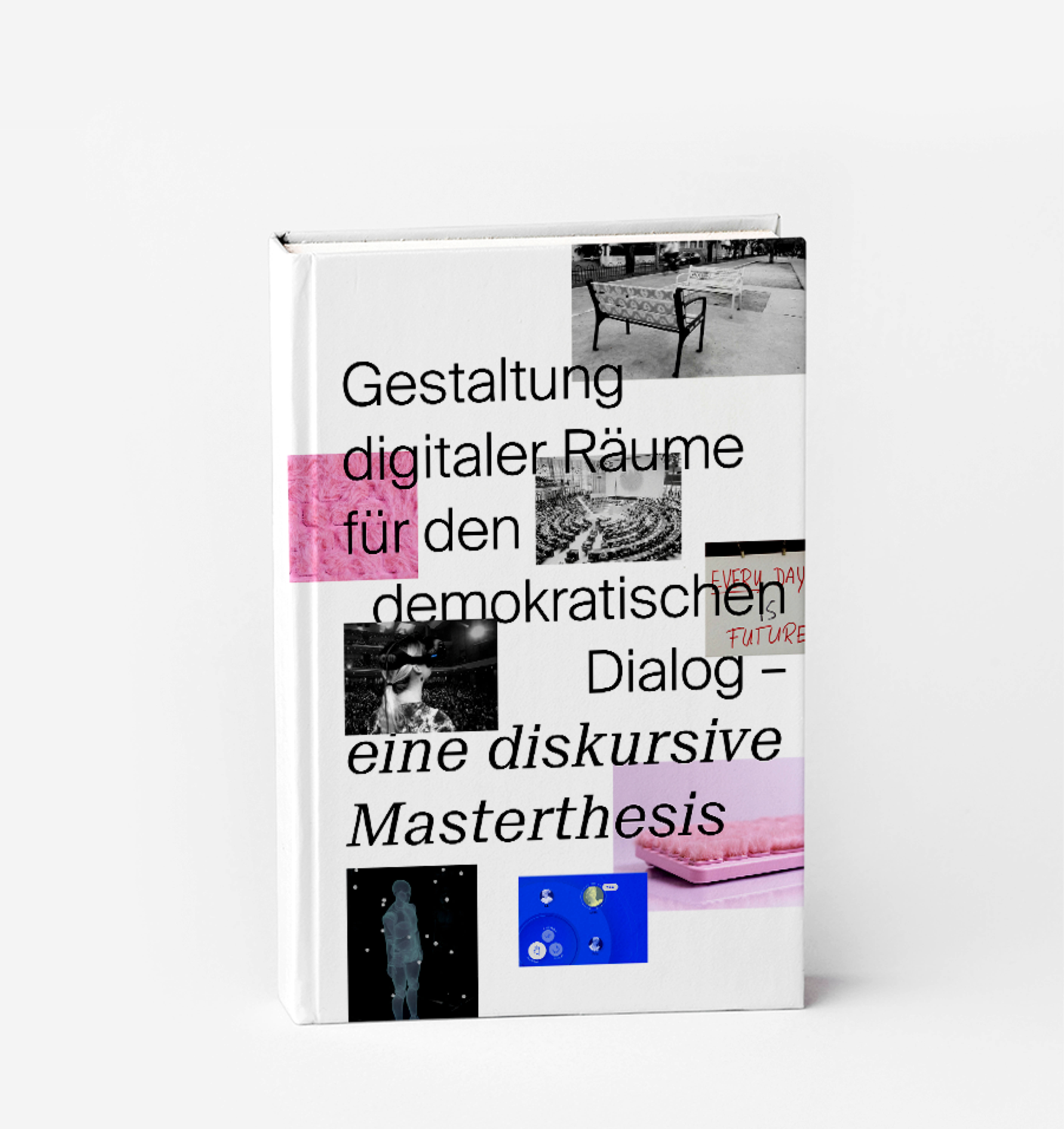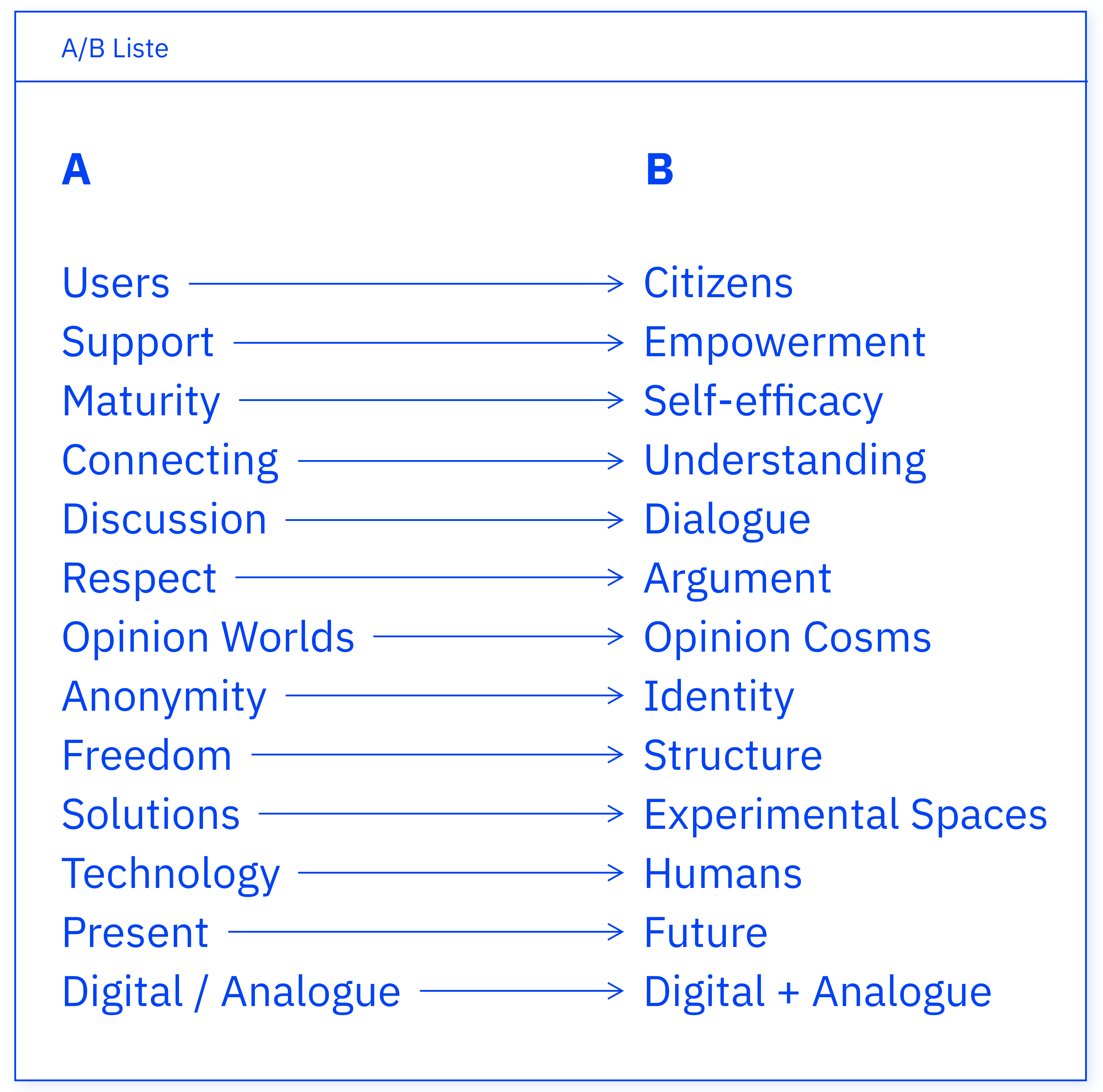Knowledge base for the design of digital spaces
The findings presented can be helpful for the design of digital spaces for democratic dialog – such as social platforms, comment columns of online newspapers or specific civic technology applications. Our podcast, which was created in dialog with experts, allows an easy start into the topic. And for ambitious readers, the master's thesis is also available for download.
open in Spotify download thesis

01 DEMOCRACY, DIGITALIZATION,
DISCOURSE
In our first episode, we talk to experts about democracy, its roots, the digital transformation, and why it is important (especially nowadays) to interact and discuss with each other as a society.
02 COMMUNNICATION AND DIALOG
In the second episode of our podcast, we talk about 'talking' itself. What makes a conversation a good dialog? How can we talk to each other in a more unbiased way? And: What actually influences our communication?
03 DIALOG AND SPACE
In the third episode, we focus on the spaces within which we communicate. We ask ourselves to what extent environments influence dialog. We look at the problems and opportunities of digital spaces and how we can make them more dialog-friendly.
Core beliefs
01
A democracy also needs public spaces for dialog in the digital realm, i.e., inclusive, accessible places for encounters
02
The (non-)design of digital and analog spaces influences the way we engage in democratic dialog with each other - social awareness is needed for this.
03
Democracy begins at eye level: In this respect, digital spaces should promote genuine dialogs that are respectful and understanding.
04
Digital spaces that allow productive dispute are just as important for a healthy democracy as those that support the pursuit of consensus.
05
Citizens need environments that reveal other positions and allow them to reflect and develop their own points of view.
06
Citizens must be actively involved in the process of designing digital spaces which are made for democratic dialog.
07
Those responsible for designing digital spaces should be aware of their own understanding of values and democracy.
08
Communicative principles and analogies from analog encounters can be helpful in designing digital spaces for dialog, but they need to be thought through further for the digital realm.
09
In order to explore possible digital futures, we need spaces that make it possible to experiment and experience alternatives.
A/B
As a homage to the designer couple Dunne & Raby, the A/B-section illustrates our understanding of democracy and design. B is not meant to replace A, but to add a new perspective on democracy and design and to stimulate discussion.

Design parameters
The design parameters are intended to facilitate the engagement with digital spaces. They make the design of social rules and communicative practices tangible, comparable and discussable and can be used as a starting point for designing alternatives. We do not see the current parameter selection as a final model but as a useful methodology and starting point for further research. The arrangement below the ideals of Civic Friendship, Diversity of Opinion and Public Sphere (→ see Core beliefs) provides orientation and shows the assumed interrelationships, but is not to be viewed in a separable way.
CIVIC FRIENDSHIP

Is there a separation between public and private or does everything take place in the "same space" (e.g. Facebook)? Does the application have a specific purpose (e.g. LinkedIn)? Is communication reciprocal and interrelated, or can anyone contribute at any time?

Are there volunteer moderators from the community itself and do the moderators actively and visibly appear (e.g. Reddit, ZEIT Online) or do employees act invisibly in the background? (How) do AI programs support the evaluation of contributions?

Are citizens drawn into spaces and interactions or does communication remain distanced? Is communication only in writing (e.g. Twitter) or are there channels that enable non-verbality and physicality (e.g. Instagram AR Filter)?
DIVERSITY OF OPINION

Is the focus on the reception of content or on communication with social contacts? Is there an obligation to contribute something to the communication or is it possible to merely read along as a so-called lurker and remain passive?

Does it take time to follow and participate in dialogs or is the dialog broken down to short written contributions (cf. Twitter)? Are users obliged to respond to others (e.g., on Der STANDARD) and to react promptly, or are one-time statements possible?

Does the application interrupt automated behavior and create moments of pause or reflection? Or is the operation smooth and do habituation effects and unconscious behavior patterns set in?
PUBLIC SPHERE

Do citizens move in spaces where they can meet people from outside their bubble or are they closed or private spaces with selected dialogue partners?

Is the presence and activity of others perceived and represented (cf. Instagram Live, watching)? Is physicality created or are rudimentary visualizations used?

Are encounters deliberately curated and does the selection follow certain business logics (cf. Facebook)? Or are random encounters possible, or even supported by the application?
Parameter catalog
The parameter catalog is a dynamic rule catalog and a first attempt to make digital spaces classifiable.
You have feedback, criticism or ideas for further development? We are looking forward to hearing from you.
RANDOMIZER
Find examples of digital spaces with the following two parameters. Or use them to design your own space for dialog!
